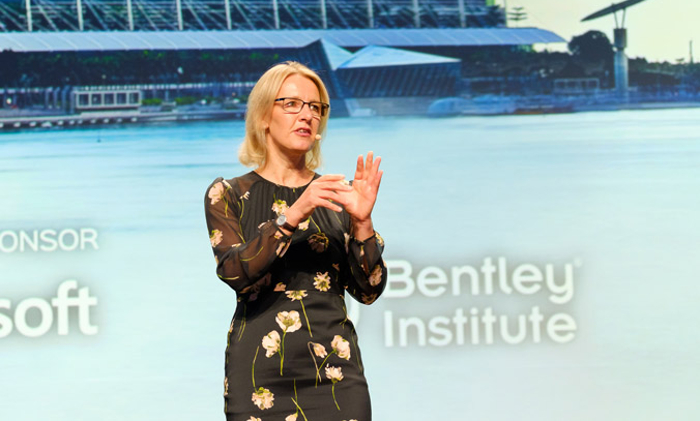Since 2009, Alison Watson’s Class of Your Own has been the industry’s key advocate of getting young people interested in construction. The path has been long but the message is being heard by the industry
Digitally savvy construction professionals are hard to find, and expensive to recruit, but how many of you have a strategy which looks ahead five or ten years to creating your own in-house?
We frequently see published warnings from industry leaders in almost every profession, bemoaning the low quantity of good quality young candidates coming through the education system, and the construction industry is certainly no different. We need to compete with medicine, finance and the law in capturing the best talent early, and a general ignorance amongst students and even parents of the career opportunities available in the construction sector makes this difficult.
Ask most fifteen-year-old students to name construction-related job roles, and the answer is likely to be builder and architect. Ask the same group about career advice they received in relation to construction, and they could well describe a retired civil engineer who came into bore them with stories about the good-old days. Young people choosing to pursue a career in construction, is almost always due to a link to some friend or relative that works in the sector. We never envy school-leavers having to make such an important choice about their future career, whether it is signing up for a university place, or joining an apprentice scheme, we are expecting them to make a very mature decision.
Alison Watson and Class of Your Own is trying to do something about that, by addressing a long-term strategy for educating secondary school students on the breadth and depth of worthwhile opportunities to be found in construction.
Ten years ago, as a former land surveyor, Watson started to work with schools, building materials for use in the classroom, which explore the different roles and activities involved. This led to the creation of a series of award-winning qualifications aimed at students from eleven years old, through to GCSE and A-Level, and the results have been breathtaking, earning Watson an MBE for her efforts.
The Design Engineer Construct programme, or DEC for short, introduces industry terminology, technology, processes and professions in a way that interests and excites students. It does so under the watchful eye of industry sponsors – companies who not only fund but also support the schools through the curricula, by informing, guiding and encouraging teachers and students alike. The DEC curriculum is aimed at students ages 11 to 18 years and is offered at intermediate levels to encourage and excite learners.
It is no surprise that these sponsors get the pick of the crop amongst school leavers, sometimes filling their apprenticeship and sponsors degree programmes exclusively from DEC classrooms.
Daren Whitaker, of Renaker Build Limited, who took seven students from St Ambrose class of 2019 explained, “Here at Renaker, we’re all about identifying young people with the right character and the appropriate experience and knowledge. We’ve certainly found this by working alongside Design Engineer Construct students from St Ambrose Barlow RC High School – their personal and professional development continues within the organisation, to the mutual benefit of the business and the individual.
“We are committed to the training and development of these young people and take great pride in seeing their achievements.”
With around one hundred schools up and running in the UK, and support from Heriot Watt University and global industrial partners including Topcon Positioning Systems and Mott MacDonald Group, the programme is poised to go international. Watson commented on the highs and lows of introducing innovation in the constantly changing political landscape of education: “Education should not be about politics but spend any time with teachers and you get the impression that meeting targets and filling out paperwork is more important to the system than the childrens’ education. This made the early years incredibly hard, finding forward-thinking headmasters that were willing to give enthusiastic teachers a free hand to try out something new for the sake of the kids. Fast-forward ten years and we still have the politic goalposts moving with every election or cabinet reshuffle, but the results in terms of impact on the career of young people has been worth the effort.
“I can’t be anything other than proud when I hear that Lauren from Manchester, who was going to law school or into finance, has achieved a major civil engineering award for apprenticeships, or that Chris from Sheffield cites DEC as a major contributing factor in getting through the first year of university degree in structural engineering with supreme confidence.” The growing flow of similar success stories is humbling.
How does it work?
When a school signs up to delivery of the DEC learning programme, the first step is to identify suitable teachers. Rarely do these teachers have any experience in design and construction but do sometimes have a product design background or have been delivering design & technology (DT) lessons previously. Otherwise, they could be mathematics teachers, physics teachers, art or geography teachers, which might sound like an inauspicious start to instructing tomorrow’s engineers. But with the support of teacher- training specialist, White Frog, teachers soon gain the confidence to dive in.
Paul Woddy, who heads the DEC team at White Frog explains more, “Teaching DEC teachers is unlike any other training we have ever done and has easily become my favourite course to deliver – after all these years I still jump at the chance to deliver the courses personally, rather than delegate the fun! The challenge is not to turn a maths teacher into a construction professor or even a CAD expert, but to demonstrate that teachers already know enough to light a fire under the students and point them in the right direction. In fact, you could argue that teachers are the ultimate expert in how a classroom or school should be designed, and in the first round of training, it is our job simply to unlock their confidence to do exactly that, and to help the students design an eco-classroom.
The courses and books that we have developed introduce just enough of the process, terminology and technology to take away the fear, remembering that each school is supported by professionals that visit the classroom and help explore different aspects throughout. When it comes to the technology, we often hear that last year’s students know more about Revit or OpenBuilding than the teacher does, even deliver classes to this year’s students. This might sound strange, but the curriculum is so well defined that with a little guidance and periodic professional support, the students run with it.”
Structured professional support is vital to the DEC programme, and can’t be delivered by random visits from whoever is available on the day. The sponsor liaises with the teacher to map out an annual plan, ensuring that the appropriate professional is on hand to support the teacher through the various stages of the process. This means working with architects, planners, engineers, surveyors and many others to engage students and explain the nuances of their role, in the context of the student project.
Through the DEC qualifications, students get a good feel for the industry; they explore the different career options and they can leave school at sixteen or sixth-form college at eighteen with up to five years of software experience. One implication is that students enter University and higher education with raised expectations, and whilst no-one is suggesting that the have degree-level depth of knowledge, they certainly have the skills and understanding to give them a good head-start.
DEC is looking for industry sponsors. If you want to get involved, to help inspire the next generation of construction professionals visit
Bentley backs education

At Bentley Systems’ Year In Infrastructure (YII) event in Singapore last month, Class of Your Own featured prominently. It was clear that Bentley’s management were putting their full weight behind the program and were willing to back Watson’s aims on a global scale.
At the event, Bentley and Class of Your Own announced a new global partnership to continue to develop the future-focused global DEC curriculum. Through Bentley Institute’s support of Class of Your Own’s DEC programmes students will be able to gain hands-on knowledge and skills for careers in key infrastructure professions.
With DEC expanding outside the UK, the new programme is already moving into schools in Ireland, Lithuania, Thailand and the United Arab Emirates and offers technology education and project-based, real-world experiences through interaction with industry professionals.
DEC will feature access to Bentley’s engineering design and 3D modelling technologies including ContextCapture, OpenBuildings, OpenRail, and OpenRoads ConceptStation. The more advanced future infrastructure qualification framework, for students aged 16 and older, including foundation level study at colleges and universities, focuses on rail, highway, port, and hyperloop projects.
“Our vision is to inspire and engage young people and their teachers to reach their full potential through world class education,” said Watson “So, we’re very excited to partner with Bentley to offer the new curriculum, which applies industry knowledge and skills gained in the existing DEC programme to the most exciting infrastructure projects around the world.
“Our students are provided with face-to-face support from world-class sector professionals thanks to industry partners who truly understand what DEC can do. Expanding the programme outside the UK means we can offer genuine, meaningful opportunities for students and teachers around the world. We’re helping the surveyors, technologists, engineers, architects and managers of future infrastructure.”
Earlier in 2019, Bentley Institute and Class of Your Own hosted the first ever Future Infrastructure Challenge: DEC Hyperloop challenge in London. The event included students from four schools in the UK whose assignment was to conceptualise a design of a hyperloop transport system and stations for their own towns and then to adapt this to Singapore.
Students from Drummond Community High School from Edinburgh, Scotland won the challenge and were awarded a complimentary trip from Bentley to attend the YII event in Singapore.
David Robertson, director of digital advancement research for Bentley Systems, said, “Our partnership with Class of Your Own demonstrates the two organisations’ shared goal of providing students with valuable learning experiences that apply to real-world infrastructure professions and encourage students to pursue those professions. Bentley is very excited to participate in this important learning initiative to advance career opportunities for students around the world.”
At the black-tie awards event, Bentley gave Watson a surprise Bentley Institute Knowledge Advancement Advocate Award in recognition of all she has achieved with Class of Your Own and promoting young people to consider infrastructure as a profession. She was joined on stage by the winning Future Infrastructure Challenge team from Scotland, complete with kilts, an epic moment that brought a standing ovation.
If you enjoyed this article, subscribe to our email newsletter or print / PDF magazine for FREE






